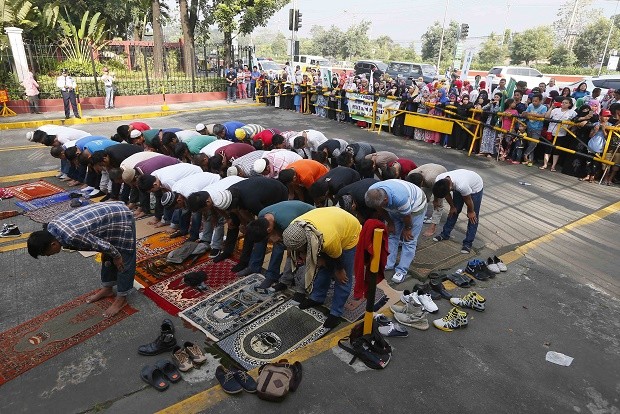
Filipino Muslims pray at the gates of Congress during a protest on Feb. 3, 2016, in Quezon city. The Philippine Congress has run out of time to pass under the current president’s term a Muslim autonomy bill that aims to peacefully settle a decades-long Muslim rebellion in the south, sparking concerns the setback may ignite new fighting, officials said. AP
A Philippine rebel leader said Monday that Congress’ failure to pass a Muslim autonomy bill as part of a new peace pact would delay a program to disarm thousands of guerrillas in the country’s south.
Mohagher Iqbal said his rebel group, the Moro Islamic Liberation Front, will stick with a 2014 peace agreement it signed with the Philippine government despite the setback.
READ: MNLF happy about BBL’s non-passage at meeting with Misuari—informants | Congress adjourns, fails to pass BBL
However, Iqbal said the delay in the enactment of the bill that aims to establish a more powerful and better-funded autonomous region for minority Muslims has caused deep anxiety among guerrillas, and that the uncertainty could be exploited by radicals opposed to the peace deal.
“The peace process will proceed,” Iqbal said in an email response to questions from The Associated Press on the impact of the autonomy setback.
But the delay in the autonomy bill’s passage would halt an ongoing program in which the rebel front has pledged to turn over the weapons of thousands of its guerrillas to an independent “decommissioning body.”
Under the program, the rebel front turned over 75 assault weapons last June and selected an initial batch of 145 guerrillas who would be helped to return to normal lives.
A larger number of rebel weapons and a few thousand guerrillas would have undergone the “decommissioning process” this year had the autonomy bill been passed and ratified in a plebiscite, Philippine officials said.
There will be “no second phase of the decommissioning because that phase is tied up to the passage and ratification of the bill,” Iqbal said.
The 11,000-strong Moro Islamic Liberation Front dropped its secessionist bid and settled for broader autonomy for minority Muslims in the south of the largely Roman Catholic nation in a Malaysian-brokered pact it signed with the Philippine government two years ago.
The separatist conflict left 150,000 people dead and stunted development in the country’s poorest region.
Under the deal, a bill was submitted to Congress to create the autonomous region to be called Bangsamoro. The autonomy bill’s early passage, however, was stalled by indignation over the killing early last year of 44 police commandos in fighting that involved some Moro Islamic Liberation Front guerrillas.
Lawmakers ended the last regular session of their term on Wednesday without passing the bill. They went on a three-month break and will return in May mainly to canvass the result of that month’s presidential election.
While the government’s peace deal with the rebels remains effective, a new autonomy bill will have to be presented to the new Congress under the successor to current President Benigno Aquino III.
Iqbal warned that rebel “frustration is very high,” adding, “we are managing it.”
There are concerns that “radicals will exploit the uncertainty,” he said, citing a recent clash between government forces and a smaller but more hard-line insurgent group called the Bangsamoro Islamic Freedom Fighters, which has vowed to continue fighting for a separate Islamic state in the south.
The military says the situation remains relatively peaceful in the south and added it’s ready to deal with any contingency.
RELATED STORIES
Robredo on BBL defeat: Don’t let sadness overcome us
Aquino, Murad may meet to save peace